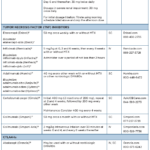Dr. Chester B. Good, from the University of Pittsburgh in Penn., coauthored an invited commentary related to this report. He told Reuters Health by email, “I think this study is quite remarkable. Most surprising was the finding that off-label use was so infrequently supported by strong evidence, and that in those situations, patients were more likely to experience an adverse drug event significant enough to warrant discontinuation of that medication.”
“Physicians should be cautious when prescribing medications off-label,” Dr. Good said. “This is particularly important when off-label use is not supported by robust clinical evidence, or when not recommended by clinical practice guidelines. In situations where physicians prescribe medications off-label, perhaps based on theoretical reasons or personal experience only, it is prudent to inform the patient.”
“I am not suggesting that physicians prescribe medications limited to the labeled indications,” he explained. “Many off-label uses of drugs are appropriate, and indeed, are in the best interest of the patient. However, I am concerned that the FDA (Food and Drug Administration) is being challenged on their restrictions on off-label drug promotion. I am opposed to relaxing restrictions on pharmaceutical promotion beyond the labeled indications.”
“This study was made possible by documentation of the indication for prescribed medications,” Dr. Good added. “Many physicians do not include the reason for taking medications as part of their prescription, and in some situations this can lead to patient confusion and/or lower levels of compliance. Health care systems with electronic prescribing should facilitate documentation of indications by providing drop-down menus with common indications, and free-text options.”
Dr. Steven R. Feldman, from Wake Forest University School of Medicine, Winston-Salem, North Carolina, has studied off-label use of dermatological drugs. He told Reuters Health by email, “It is critically important to keep in mind that the patients were not randomized to get on-label vs. off-label treatment. It is likely that if there were a straightforward, on-label best treatment for patients, they often would have received it, and that off-label use was done because it seemed best at the time because other options had either been tried or were unavailable. Despite the enormous potential that patients who received off-label use could be at higher risk for a bad outcome, the ADE outcomes for both groups were remarkably low.”
“A relative risk of about 1.4, which was seen in this study, may sound like a lot, but because the baseline risk is so low, the real risk of an ADE with off-label use is so small as to not being worth worrying or doing anything about, especially when the result comes from a non-randomized trial that cannot account for risk differences in the populations between treated with on-label vs. off-label treatment,” Dr. Feldman said.


